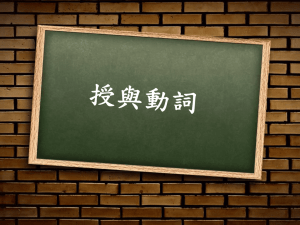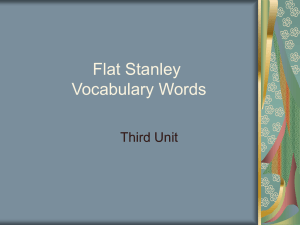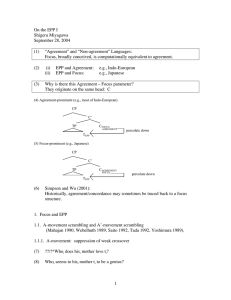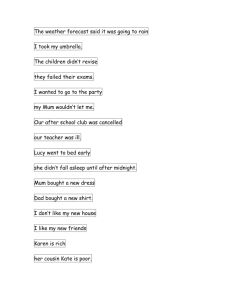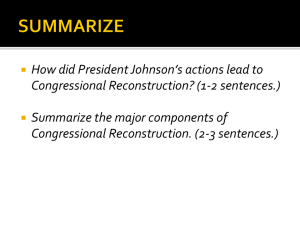To appear, Joachim Sabel and Mamoru Saito, eds., The Free... Its Syntactic Sources and Diversity. Mouton de
advertisement
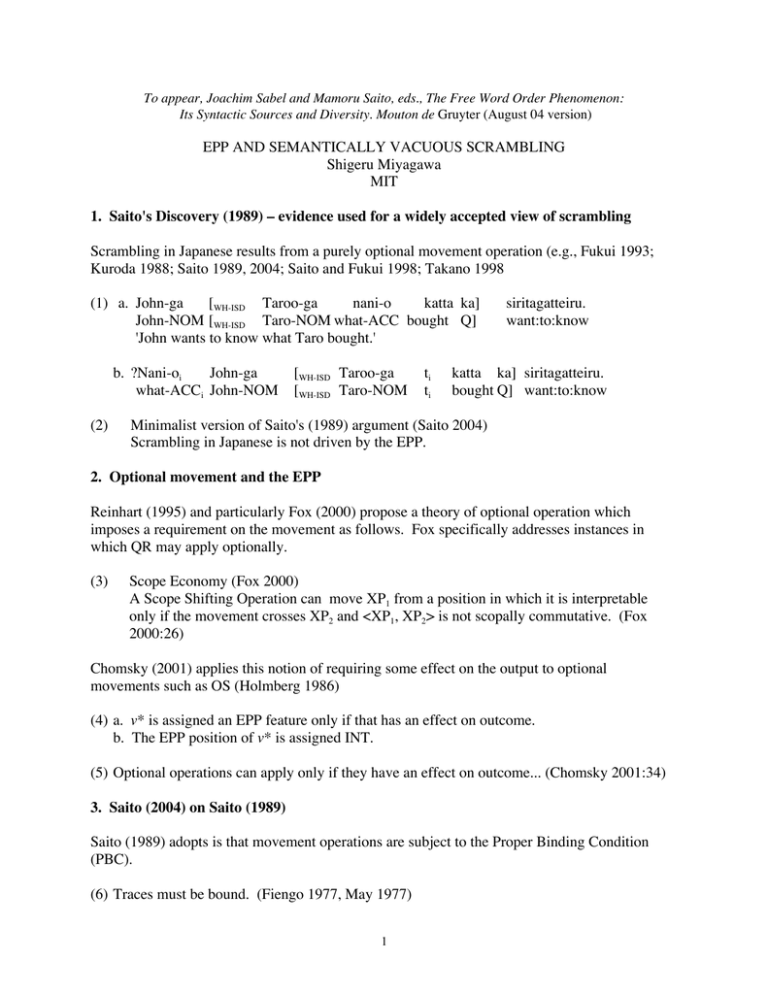
To appear, Joachim Sabel and Mamoru Saito, eds., The Free Word Order Phenomenon: Its Syntactic Sources and Diversity. Mouton de Gruyter (August 04 version) EPP AND SEMANTICALLY VACUOUS SCRAMBLING Shigeru Miyagawa MIT 1. Saito's Discovery (1989) – evidence used for a widely accepted view of scrambling Scrambling in Japanese results from a purely optional movement operation (e.g., Fukui 1993; Kuroda 1988; Saito 1989, 2004; Saito and Fukui 1998; Takano 1998 (1) a. John-ga [WH-ISD Taroo-ga nani-o katta ka] John-NOM [WH-ISD Taro-NOM what-ACC bought Q] 'John wants to know what Taro bought.' b. ?Nani-oi John-ga what-ACCi John-NOM (2) [WH-ISD Taroo-ga [WH-ISD Taro-NOM ti ti siritagatteiru. want:to:know katta ka] siritagatteiru. bought Q] want:to:know Minimalist version of Saito's (1989) argument (Saito 2004) Scrambling in Japanese is not driven by the EPP. 2. Optional movement and the EPP Reinhart (1995) and particularly Fox (2000) propose a theory of optional operation which imposes a requirement on the movement as follows. Fox specifically addresses instances in which QR may apply optionally. (3) Scope Economy (Fox 2000) A Scope Shifting Operation can move XP1 from a position in which it is interpretable only if the movement crosses XP2 and <XP1, XP2> is not scopally commutative. (Fox 2000:26) Chomsky (2001) applies this notion of requiring some effect on the output to optional movements such as OS (Holmberg 1986) (4) a. v* is assigned an EPP feature only if that has an effect on outcome. b. The EPP position of v* is assigned INT. (5) Optional operations can apply only if they have an effect on outcome... (Chomsky 2001:34) 3. Saito (2004) on Saito (1989) Saito (1989) adopts is that movement operations are subject to the Proper Binding Condition (PBC). (6) Traces must be bound. (Fiengo 1977, May 1977) 1 (7) a. ??Whoi do you wonder [which picture of ti]j John likes tj? b. *[Which picture of ti]j do you wonder whoi John likes tj? Riemsdijk and Williams (1981). (8) a. Whoi ti knows [which picture of whom]j Bill bought tj? b. ??[Which picture of whom]j do you wonder whoi ti bought tj? (Engdahl 1986) (9) [Which picture of himselfi]j did John like tj? “chain binding” Barss (1984) (10)a. John-ga [WH-ISD Taroo-ga nani-o John-NOM [WH-ISD Taro-NOM what-ACC 'John wants to know what Taro bought.' b. ?Nani-oi John-ga what-ACCi John-NOM [WH-ISD Taroo-ga [WH-ISD Taro-NOM ti ti katta ka] siritagatteiru. bought Q] want:to:know katta ka] siritagatteiru. bought Q] want:to:know (11) Scrambling is not EPP driven. (Saito 2004) 4. Counterarguments 4.1. Evidence for the EPP on T: Miyagawa (2001) (12) Taroo-ga zen’in-no-syasin-o mi-nakat-ta. Taro-NOM all-GEN-photo-ACC see-NEG-PAST ‘Taro didn’t see everyone's photos.’ not > all, all > not Kato (1988). (13) Zen’in-no-gakusei-ga san-satu-no hon-o all-GEN-student-NOM three-GEN book-ACC ‘Every student did not read three book.’ *not > all, all > not Miyagawa (2001) (14) San-satu-no-hon-oi 3-CL-book-ACCi not > all, all > not zen’in-no-gakusei-ga ti all-GEN-student-NOM ti 2 yoma-nakat-ta. read-NEG-PAST yoma-nakat-ta. read-NEG-PAST (15)=(13) TP alli T' T vP ti Neg v' VP v Object... (16)=(14) TP OBJ i T' T vP all Neg v' VP v ti 4.2. Reanalyzing Saito’s arguments As noted earlier, Saito (1989) gave following kinds of arguments against reconstruction. (17)a. ??Whoi do you wonder [which picture of ti]j John likes tj? b. *[Which picture of ti]j do you wonder whoi John likes tj? 3 (18)a. Whoi ti knows [which picture of whom]j Bill bought tj? b. ?? [Which picture of whom]j do you wonder whoi ti bought tj? Re (18): No reconstruction into an island (e.g., Cresti 1995, Longobardi 1987) May (1985) (19) Whati did every boy buy ti? PL Longobardi (1987) (20) Whati do you wonder whether every boy bought ti? *PL 4.3. Argument against radical reconstruction Direct evidence against two points Saito suggests: (i) there is no reconstruction due to the PCB; (ii) the wh-phrase in (1b), which has scrambled out of an indirect question, undergoes radical reconstruction. Lebeaux (1988); cf. also van Riemsdijk and Williams (1981), Freidin (1986)). Note the contrast below. (21) ??/*[Which criticism of Johni]j did hei reject tj? (22) [Which criticism that Johni heard]j did hei believe tj? The data gives evidence for reconstruction in English, in contrast to the assertion in Saito (1989). Nishigauchi (2002) observes that there is a similar argument/adjunct asymmetry in Japanese; I will introduce a crucial example from his work later, but because it involves one complication, I will first present a pair of examples below to illustrate the “Lebeaux” effect in Japanese. (23) a. ??/?* [Minna-no Johni-no hihan-o]j karei-ga [everyone-GEN Johni-GEN criticism-ACC]j hei-NOM [Hanako-ga tj osiete-kureta to] itta. [Hanako-NOM tj told.him C] said ‘[Everyone’s criticism of John], he said that Hanako told him. b. [ [Minna-ga Johni-kara kakusite-ita] hihan-o]j karei-ga [ [everyone-NOM Johni-from was.hiding] criticism-ACC]j hej-NOM [Hanako-ga tj osiete-kureta to] itta. [Hanako-NOM tj told.him C] said ‘The criticism that everyone was hiding from John, he said that Hanako told him.’ Nishigauchi (2002: 84), taken from Lanik and Saito (1999). 4 (24) [Johni-ni-tuite-no dono hon]-oj karei-ga [Johni-about-GEN which article]-ACCj hei-NOM [Hanako-ga tj ki-ni-itte iru ka] sitte-iru. [Hanako-NOM tj like Q] knows 'He wants to know which book about John, Hanako likes.' 5. Escape hatch in indirect question: the real significance of Saito (1989) Saito’s (1989) “discovery,” with some extensions, gives support to two proposals in the literature: -- Watanabe's (1992) proposal that an empty operator is moving in wh-in-situ (or alternatively, Tsai's (1994) idea that wh-in-situ is licensed by unselective binding by Q on C); -- A particular version of Kuroda's (1988) idea that there is "no forced agreement" in Japanese; the particular version I will demonstrate is that when a Head agrees with an element, the specifier of this Head may host some other element, thus showing that there is no forced Spec-Head agreement. What really is happening with Saito’s (10b), repeated below? (10) b. ?Nani-oi John-ga [WH-ISL Taroo-ga ti katta what-ACCiJohn-NOM [WH-ISL Taro-NOM ti bought 'John wants to know what Taro bought.' ka] siritagatteiru. Q] want:to:know The wh-phrase is able to employ the Specifier of CP of the indirect question as an escape hatch. (26) ?Nani-oi John-ga [WH-ISL ti [TP Taroo-ga ti katta ka]] siritagatteiru. what-ACCi John-NOM [WH-ISL ti [TP Taro-NOM ti bought Q]] want:to:know 'John wants to know what Taro bought.' Two possible reasons why the wh-phrase may move through the Spec of CP: (i) the scrambling of the wh-phrase into the Spec of CP counts as wh-movement, and fulfills the [+wh] selectional requirement (e.g., Takahashi 1993 (ii) the [+wh] requirement is met even before the wh-phrase moves; an agreement relation is established between the wh feature on the wh-phrase-in-situ and the Q feature on C (ii) is right? (27) ?Nani-oi John-ga [WH-ISL ti [TP dare-ga ti katta ka]] siritagatteiru ndai? what-ACCi John-NOM [WH-ISL ti [TP who-NOM ti bought Q]] want:to:know Q 'What does John wants to know who bought?' (answer: John wants to know who bought A BOOK.) 5 No Spec-Head Agreement (cf. Kuroda 1988) (28) CP (Indirection question portion) nanij C’ TP darei Ci T’ …tj… (29) Japanese has no forced Spec-Head agreement. Kuroda (1988) 6. Further note on radical reconstruction Saito (2004) gives two well-known phenomena as further evidence for reconstruction. Binding (cf. Mahajan 1990, Saito 1992) (30) ?Karera-oi [otagai-no sensei]-ga they-ACCi [each.other-GEN teacher]-NOM 'Each other's teacher criticized them.' ti ti hihansita criticized (koto) LD scrambling (31) *Karera-oi [otagai-no sensei]-ga [CP Tanaka-ga ti they-Acci [each.other-GEN teacher]-NOM [CP Tanaka-NOM ti itta (koto) said 'Each other's teacher said that Tanaka criticized them.' hihansita criticized Oka (1989)/Tada (1993) facts for quantifier scope (32) Dareka-ga daremo-o aisiteiru. someone-NOM everyone-ACC love 'Someone loves everyone.' some > every, *every > some (33) Daremo-oi dareka-ga everyone-ACCi someone-NOMti every > some, some > every ti aisteiru. (Kuroda 1971) loves Oka (1989)/Tada (1993) (34) Daremo-oi dareka-ga [Tanaka-ga everyone-ACCi someone-NOM [Tanaka-NOM 'Everyone, someone said that Tanaka loves t.' some > every, *every > some 6 ti ti aisiteiru to] love C] itta. said to] C] Suppose, as has been suggested in the literature, that scrambling of a quantifier may count as an instance of overt QR (cf. Kitahara (1995), Miyagawa (2003b), Sohn (1995),Tonoike (1997)). (35) Scope Economy (Fox 2000) A Scope Shifting Operation can move XP1 from a position in which it is interpretable only if the movement crosses XP2 and <XP1, XP2> is not scopally commutative. (Fox 2000:26) Optional application of QR is possible if it leads to a new scope relation May (1977): QR is clause bound. (36) a. Someone loves everyone. some > every, every > some b. Someone thinks that Mary loves everyone. some > every, *every > some Moltmann and Szabolci (1994) as discussed by Fox (2000). (37) a. One girl knows that every boy bought a present for Mary. one > every, *every > one b. One girl knows what every boy bought for Mary. one > every, every > one (38) Daremo-oi dareka-ga [ti Tanaka-ga everyone-ACCi someone-NOM [ti Tanaka-NOM 'Everyone, someone said that Tanaka loves t.' some > every, *every > some ti ti aisiteiru to] love C] This example shows the effect of "clause boundedness" of QR. Editorial situation: (39) Dono-ronbun-moi dareka-ga [ti Tanaka-kyouzyu-ga ti every-article-ACCi someone-NOM [ti at.least.one.professor-NOM ti hihansuru to] omotteiru. criticize C] thinks. ‘Every article, someone thinks that Professor Tanaka will criticize.’ some > every, ??/*every > some 7 itta. said (40) Dono-ronbun-moi dareka-ga [ti sukunakutomo-hitori-no-kyouzyu-ga every-article-ACCi someone-NOM [ti at.least.one.professor-NOM ti hihansuru to] omotteiru. ti criticize C] thinks. ‘Every article, someone thinks that at least one professor will criticize.’ some > every, (?)every > some Same effect with indirect question – similar to the Moltmann/Szabolci English example in (37b) (41) Dono-hon-moi dareka-ga [CP ti [dare-ga ti yonda ka]] every-booki someone-NOM [CP ti [who-NOM ti read Q]] siritagatteiru. want:to:know 'Someone wants to know who read every book.' every > someone, someone > every Problem: no PL here (Hoji 1986). (42) Daremo-o dare-ga everyone-ACC wh-NOM ‘Everyone, who loves?’ Single pair, *pair-list aisiteiru no? love Q 7. Where radical reconstruction really exists No (radical) reconstruction: adjunct (43) [Johni-ni-tuite-no dono hon]-oj karei-ga [Johni-about-GEN which article]-ACCj hei-NOM [Hanako-ga tj ki-ni-itte iru ka] sitte-iru. [Hanako-NOM tj like Q] knows 'He wants to know which book about John, Hanako likes.' Again, no (radical) reconstruction: observes conditions on optional movement (44) Dono-ronbun-moi dareka-ga [ti sukunakutomo-hitori-no-kyouzyu-ga every-article-ACCi someone-NOM [ti at.least.one.professor-NOM ti hihansuru to] omotteiru. ti criticize C] thinks. ‘Every article, someone thinks that at least one professor will criticize.’ some > every, (?)every > some A true case of radical reconstruction/PF scrambling? (45) Daremo-oi dareka-ga [Tanaka-ga everyone-ACCi someone-NOM [Tanaka-NOM 'Everyone, someone said that Tanaka loves t.' some > every, *every > some (cf. also Sauerland and Elbourne 2002) 8 ti aisiteiru to] itta. ti love C] said (46) Radical reconstruction Radical reconstruction occurs only when the scrambling is not motivated by any universal conditions on movement. (47) a. [TP Taroo-gai [vP [TP Taro-Nomi [vP 'Taro bought a book' b. [TP Hon-oi [TP book-Acci (48) San-satu-no-hon-oi 3-CL-book-ACCi not > all, all > not ti ti hon-o book-Acc [vP Taroo-ga ti [vP Taroo-ga ti kat]-ta. buy]-Past kat]-ta. buy]-Past zen’in-no-gakusei-ga ti all-GEN-student-NOM ti yoma-nakat-ta. read-NEG-PAST Long-distance scrambling cannot meet the EPP requirement of the T to which it adjoins (Miyagawa 2001). (49) Syukudai-oi zen'in-ga [CP sensei-ga ti dasu to] homework-Acc all-Nom [CP teacher-Nom ti assign C] omowa-nakat-ta. think-Neg-Past 'Homework, all did not think that the teacher will assign.' *not >> all, all >> not (50) Obligatory and optional scrambling (i) Clause-internal scrambling triggered by the EPP on T — it is not an optional movement; (ii) Long-distance scrambling is an optional movement, and is subject to the condition on optional operation. (51) Types of chain spell-outs (i) overt movement: (ii) covert movement1: (iii) radical reconstruction: Head pronounce, interpret interpret pronounce 1 Tail (interpret) pronounce (, interpret) interpret See, for example, Bobaljik 1995, Fox and Nissenbaum 1999, Pesetsky 1998, Groat and O’Neil 1996. 9 When, precisely, does radical reconstruction occur? Neeleman and Reinhart (1998): scrambling may lead to a variation in the focus potential of the sentence. See Ishihara (2001). (52) Taroo-ga [VP hon-o Taro-Nom [VP book-Acc 'Taro bought a book.' katta] bought] (52) can be used as an answer to the following three questions: (53) a. What happened? (focus on IP) b. What did Taro do? (focus on VP) c. What did Taro buy? (focus on object) (54) has a different focus domain set due to the scrambling of the object. (54) Hon-oi Taroo-ga [VP book-Acci Taro-Nom[VP ti ti katta] bought] The focus domains are the subject NP Taroo and the TP, but the VP cannot be a focus domain because it does not contain the stress. Therefore (54) cannot be used to answer “What did Taro do?” (55) Hanako-ga [CP Taroo-ga hon-o katta to]itta. Hanako-Nom [CP Taro-Nom book-Acc bought C] said 'Hanako said that Taro bought a book.' This sentence can be used to answer the following three questions. (56) a. What did Hanako say happened? (focus on subordinate IP) b. What did Hanako say that Taro did? (focus on subordinate VP) c. What did Hanako say that Taro bought? (focus on subordinate object) (57) Hon-oi Hanako-ga Book-Acci Hanako-Nom [CP ti [CP ti Taroo-ga Taroo-Nom ti katta ti bought to] C] itta. said The scrambling of hon-o 'book-Acc' within the subordinate clause deprives the focus reading on the VP, as we saw for the example (54). This means that this scrambling has a meaningful effect on the output of this movement, hence the first movement is licensed. Note, now, that the entire sentence in (57) can answer (56a) and (56c), but not (56b). (58) Radical reconstruction ("PF" scrambling) Radical reconstruction occurs only if a quantifier is moved by illicit optional movement. This is a fundamentally different portrayal of radical reconstruction than Saito (1989) and Sauerland and Elbourne (2002). They assume that radical reconstruction — or PF scrambling — 10 is widely prevalent. What I have shown is that PF scrambling occurs in an extremely narrow range of data — when a quantifier is moved illicitly. A prediction about a Condition C violation that should occur even if the antecedent is contained in an adjunct. Note the contrast below. (59) a. [Tarooi-ga kaita ronbun]-oj karei-ga [Hanako-ga tj hihansita [Taroi-NOM wrote article]-ACCj karei-Nom [Hanako-NOM tj criticize itta. said ‘He said that Hanako criticized the article that John wrote.’ to] C] b. ??/*[Tarooi-ga kaita dono ronbun]-moj karei-ga [Taroi-NOM wrote every article]jhei-NOM [Hanako-ga tj hihansita to] itta. [Hanako-NOM tj criticize C] said ‘He said that Hanako criticized every article that John wrote.’ 8. The nature of Saito's original data (60) ?Nani-oi John-ga [WH-ISL Taroo-ga ti katta ka] siritagatteiru. what-ACCi John-NOM [WH-ISL Taro-NOM ti bought Q] want:to:know 'John wants to know what Taro bought.' No radical reconstruction: conditions on optional movement is observed (61) [Johni-ni-tuite-no dono hon]-oj karei-ga [Johni-about-GEN which article]-ACCj hei-NOM [Hanako-ga tj ki-ni-itte iru ka] sitte-iru. [Hanako-NOM tj like Q] knows 'He wants to know which book about John, Hanako likes.' One place where D-linking has been identified is in pair-list interpretation (e.g., Comorovski 1996, Hornstein 1995). (62) Who bought what? Bolinger (1978). (63) a. It's nice to have all those times scheduled, but when are you doing what? (#But what are you doing when?) b. It's nice to have all those activities ahead of you, but what are you doing when? (#But when are you doing what?) 11 (64) Dare-ga nani-o who-Nom what-Acc 'Who bought what?' katta bought (65) Nani-oi dare-ga ti what-Acci who-Nom ti 'What, who bought?' no? Q katta no? bought Q 12

